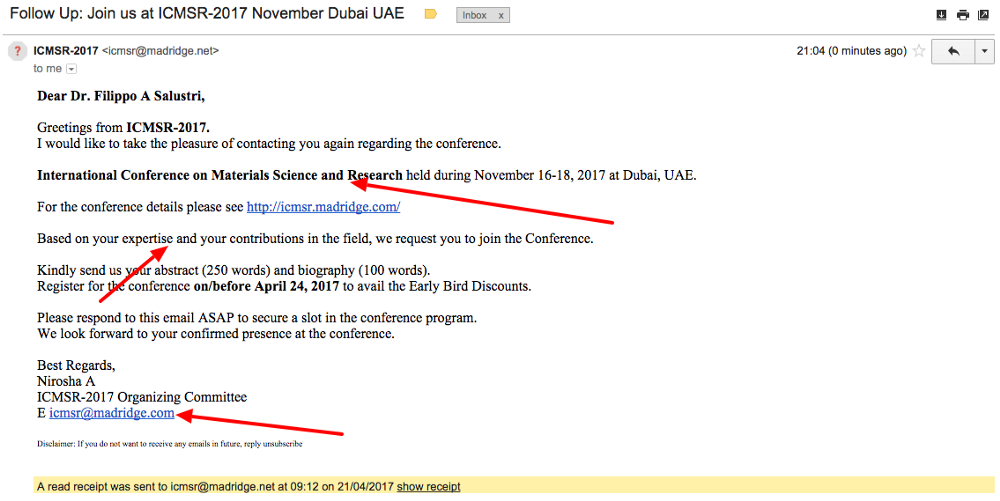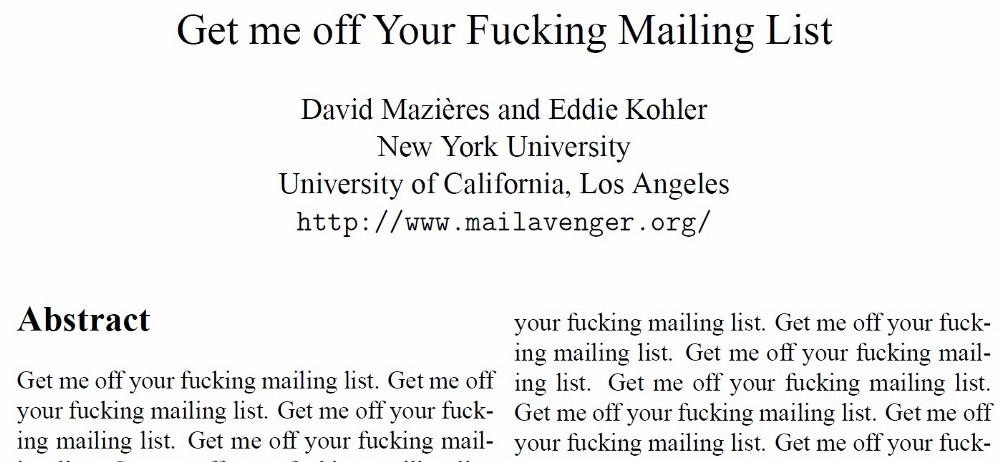Predatory conferences, now-a-days, have become a common threat that prey on unwary researchers and especially researchers and student researchers from developing countries. At a first glance, these predatory conferences seem to be legitimate science based events. But these conferences are only organized by revenue generating companies who exploit presenters and attendees only to maximize their profits. The organizers only care for money, and posses zero interests in promoting science or maintaining business and academic ethics. They falsely advertise that top academics in their respective field will be presenting, but in real scenario they do not; there is no peer-review and higher fees for registration and other purpose.
So, how do you identify those predatory conferences?

Check Email:
If you are from the biology field, and receiving invitations for an engineering conference than that is surely scam. Generally, the scope of the conference will be broader e.g. a predatory engineering conference organizers might send out invitations to the people working on different disciplines — mechanical, electrical, chemical etc. Even the organizers narrow it down to one discipline, say electrical, then you will find that there are sessions for each and every discipline from the electrical engineering field.
The language in emails from predatory conferences will often be overly informal (such as “Dear Friend”, “Dear Esteemed Colleague), in badly written English, or appear unprofessional.

Check the Website:
A legit conference website will have a professional look. Check their contact details, emails and all other contents from their website. Do you find any bad English, or misspelled keywords or improper jargon in your field? If the answers are Yes, then it might be a scam. Also, check number of meetings, their place and time — if too many meetings and sessions are packed in same place then there is a high chance that it is a scam. Predatory conference websites and emails resemble travel and holiday brochures rather than conference notices. You should also check the registration fees, usually they have higher fees for registration.

Check for the Invited Talk:
Legitimate conference organizers invite prominent researchers to present their work. In predatory conferences, you will find a very few invited talks, and the speakers are not well known. If you see big names, don’t trust because on the actual day you will find a small note written by side “talk cancelled” — even in legit conferences it happens — some speakers can’t make on that day. And, for those academic scammers it is fairly easy to do this sort of scam.
Advising Committee Members:
This is the part where the organizers deceive you — they put some famous names in the advising committee members. They will put their name and institution name but you will not find their contact details e.g. Dr. Flintstone, USA or Dr. Tintin, XYZ university. Apart from that, you will see that most of the members are picked from some low tier universities or research organizations. The organizers and other members will overwhelmingly come from a single country. Along with that, the organizers will also falsely claim that certain institutions, universities and corporations are their partners and sponsors.
Inadequate Peer Review:
No peer review will take place or a single reader reviews submissions will occur. The organizers will review submissions, and often you will find that the person who reviewed your article is not from your field. Machine-generated abstracts or papers will be accepted too.

Acceptance Time and Rate:
Submitted abstracts will probably be accepted within a week. You will get receive acceptance decision even before the Call for Papers has closed. You might also find an extension to the Call for Papers submission deadline or accepting papers after the deadline passed. The acceptance rate will be higher.
Connection to Other Predatory Conferences or Journals:
The accepted papers will be funneled to known or suspected predatory journals. Presenters, session chairs, keynote speakers or conference proceedings editors will have connections to other predatory conferences or journals. However, you might want to read this article to educate yourself about the scope of publishing your papers in legit journals and conferences.
Virtual Presentations:
You will get an email mentioning that if you can’t make it, they will accept a virtual presentation. Legit conferences does not have that option — it is a show or no show deal for them.
In short, before thinking of submitting your work to a conference you should ask yourself — is this conference is worth my — — —
Time, Money and Reputation.
So, think and judge before you submit.
Disclaimer: No A.I. was used to write any portion of this content.


Pingback: How to Identify Predatory Journals in Your Field? - gradbunker.com
Wohh just what I was looking for, appreciate it for posting.